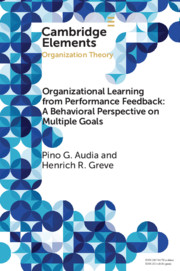Scholars often assume that reference groups are industry-wide, homogeneous, and stable. We examine this assumption and suggest hypotheses based on managers’ motivations such as self-enhancement and self-improvement, social identity, and affiliation-based impression management. We test hypotheses on failure-induced changes in reference groups and their direction in terms of upward and downward comparisons. An empirical examination of changes in reference groups for firms listed on the Dow Jones Industrial Average Index between 1993 and 2008 shows that performance below social aspirations induces changes in reference groups and toward upward comparisons. The results indicate that managers can choose to change the reference group – a cognition-centered response – as an alternative to such action-centered responses as organizational search and risk-taking in response to poor performance from social aspirations and that upward comparisons may be the result of social performance shortfalls to give a better impression and to improve firm performance.


